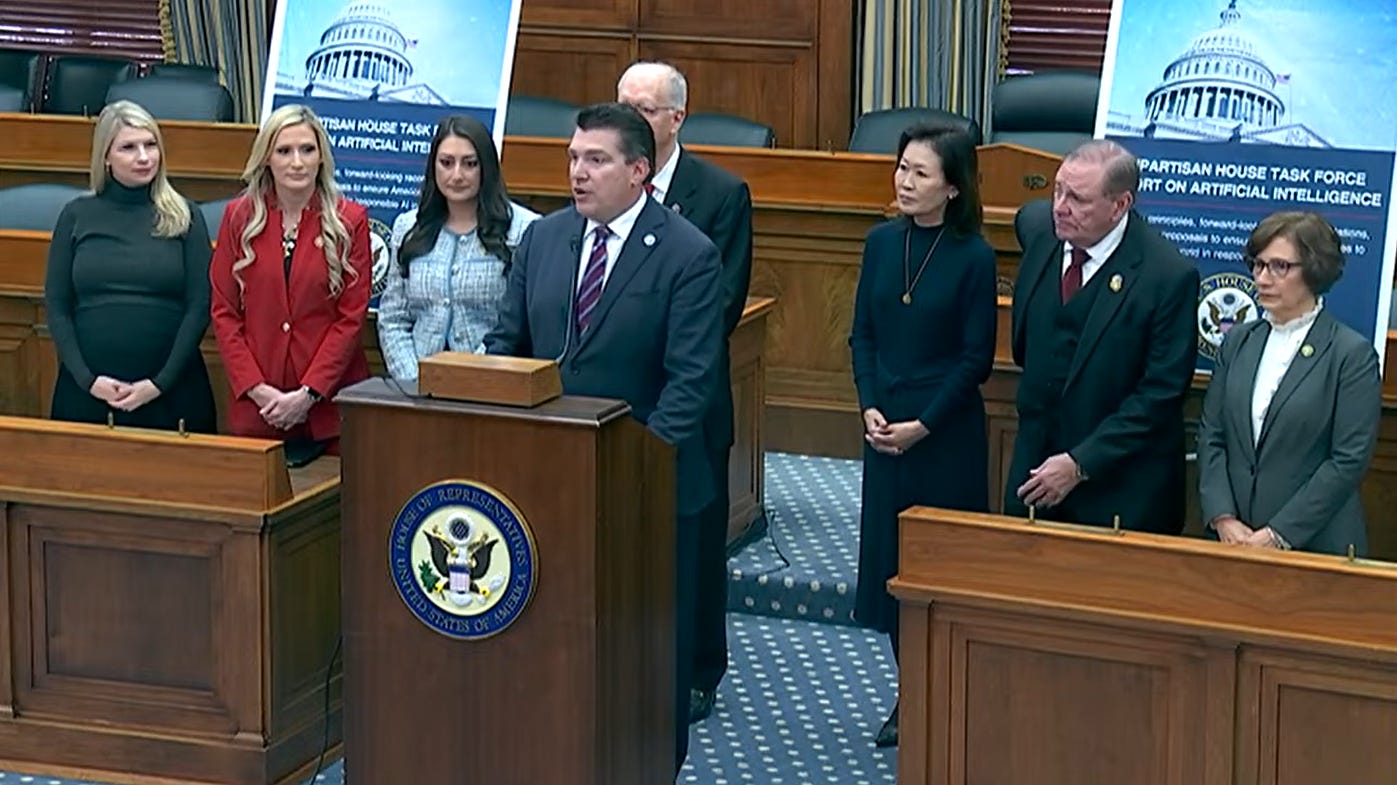Welcome to AI Policy Weekly, a newsletter from the Center for AI Policy. Each issue explores three important developments in AI, curated specifically for U.S. AI policy professionals.
Bipartisan House AI Task Force Publishes Lengthy Policy Report
The 118th U.S. Congress dedicated extensive time to studying AI and identifying bipartisan policy recommendations.
On the Senate side, Majority Leader Chuck Schumer began prioritizing AI in early 2023. He assembled a bipartisan AI working group that released its Roadmap for AI Policy just before summer 2024.
On the House side, Speaker Mike Johnson established a bipartisan AI task force just a few months into his speakership, working with Minority Leader Hakeem Jeffries to appoint 24 representatives—12 Republicans and 12 Democrats—as task force members.
Just this week, the House task force published a 273-page report with its findings and recommendations for AI governance.
The report begins with seven principles for AI policy. For example, one principle is to “identify AI issue novelty.” This means assessing whether a given concern is truly unprecedented due to new AI capabilities, essentially unchanged from its pre-AI form, or somewhere in between—a helpful step in determining the sufficiency of existing laws for addressing that concern.
Most of the report focuses on fifteen specific areas of AI policy: government use, federal preemption, data privacy, national security, research and standards, civil rights, education and workforce, intellectual property, content authenticity, open versus closed systems, energy and datacenters, small business, agriculture, healthcare, and financial services. Appendix IV also lists fifteen more areas for Congress to potentially investigate.
Here are just a few notable recommendations from the task force:
“Require that agencies provide notification of AI’s role in governmental functions.”
“Support international cooperation on AI used in military contexts.”
“Continually monitor and evaluate the impact of AI on different industries and the nation.”
“Promote research and standardization surrounding the evaluation and testing of AI.”
“Develop a full understanding of the AI workforce in the United States.”
“Identify the responsibilities of AI developers, content producers, and content distributors when it comes to synthetic content.”
“Evaluate chemical, biological, radiological, or nuclear (CBRN) threats in light of AI capabilities.”
“Strengthen efforts to track and project AI data center power usage.”
In total, there are 89 recommendations, showing a wealth of common ground between Democrats and Republicans on AI legislation. As task force chair Jay Obernolte put it in a press conference about the report, “there’s nothing inherently partisan about the regulation of AI.”

Google Releases State-Of-The-Art Video Generator, Veo 2
On Monday, Google showcased Veo 2, which appears to be the best text-to-video AI system in the world. Anyone over 18 in the U.S. can join Google’s waiting list to potentially receive early access.
Google tested Veo 2 on over 1,000 prompts from Meta’s Movie Gen Video benchmark. When human reviewers compared Veo 2’s results with outputs from other models, they preferred Veo 2 significantly more often. For instance, in a head-to-head contest with OpenAI’s Sora Turbo, reviewers preferred Veo 2 59% of the time and Sora Turbo 27% of the time, while in 14% of cases they were unsure.
Like all AI video models, Veo 2’s outputs can contain inconsistencies, unrealistic physics, and other flaws. But overall, the sample results from early users look impressive. For example, here’s “photorealistic macrophotography inside of an anthill, 75mm lens”:
AI video generators have progressed rapidly in the past two years. For example, Veo 2 clearly outclasses Imagen Video, a top-of-the-line system that Google announced in October 2022.
As advancements continue, artificial video will grow increasingly indistinguishable from real video.

Third Opinion Offers Confidential Consultations for Frontier AI Professionals
A nonprofit initiative named “OAISIS” recently launched Third Opinion, a free consultation service for people working on advanced AI who need to “evaluate concerns about AI development and deployment, safely and anonymously.”
These concerns can come in a wide variety of forms, ranging from red team testing practices and dangerous AI capabilities to broader questions about political priorities and employee protections.
OAISIS worked for nearly a year to plan and build the Third Opinion service. Here’s how it works:
Professionals anonymously submit questions through a secure, Tor-based platform about potential AI development concerns.
If needed, Third Opinion may follow up to refine the questions and identify appropriate experts.
Third Opinion connects professionals with independent experts, such as researchers, academics, think tank employees, etc.
Experts provide opinions through the secure platform, allowing for anonymous follow-up discussions.
All data is deleted after 21 days of inactivity.
The launch of Third Opinion indicates the high stakes of cutting-edge AI development.

News at CAIP
Tristan Williams wrote an op-ed about AI and music in Tech Policy Press: “Beyond Fair Use: Better Paths Forward for Artists in the AI Era.”
We issued a press release in response to the House AI task force report.
Fox News’ Alec Schemmel quoted CAIP in an article on the House AI task force report.
Knowable Magazine’s Nicola Jones quoted Jakub Kraus in an article on the “Top science stories of 2024.”
ICYMI: CAIP joined a coalition of over 30 organizations in an open letter calling on Congress to pass legislation addressing nonconsensual deepfakes.
Quote of the Week
I am deeply concerned that these [security] lapses are leaving technological breakthroughs made in US labs susceptible to theft by the Chinese Communist Party (CCP) at a time when the US and allied governments are “sounding alarms” about Chinese espionage on an “unprecedented scale.”
—Representative Tom Kean, Jr., in a letter to the CEOs of major AI companies
This edition was authored by Jakub Kraus.
If you have feedback to share, a story to suggest, or wish to share music recommendations, please drop me a note at jakub@aipolicy.us.
—Jakub





